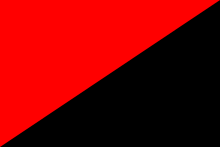Otto Rühle
Otto Rühle (23 October 1874 – 24 June 1943) was a German Marxist active in opposition to both the First and Second World Wars as well as a student of Alfred Adler.
Otto Rühle | |
|---|---|
 | |
| Born | Otto Rühle 23 October 1874 |
| Died | 24 June 1943 (aged 68) |
| Nationality | German |
| Citizenship | German |
| Occupation | Politician, philosopher, revolutionary and writer |
| Political party | |
| Spouse(s) | Alice Gerstel |
| Part of a series on |
| Left communism |
|---|
 |
|
Concepts |
|
Organizations
|
|
Related topics
|
|
Biography
Born in Großschirma on 23 October 1874, Rühle was the founder along with Karl Liebknecht, Rosa Luxemburg, Franz Mehring and others of the group and magazine Internationale which posed a revolutionary internationalism against a world of warring states. In 1916, Rühle also took part in the Spartacus League. The Spartacus League took an oppositional stance to Leninism and was criticized by the Bolsheviks for inconsistency. Although Liebknecht and Luxemburg were murdered in 1919 for their involvement in the German Revolution, Rühle lived on to participate in the left opposition of the German labour movement, developing both an early communist critique of Bolshevism and an early opposition to fascism. Rühle saw the Soviet Union as a form of state capitalism that had much in common with the state-centred capitalism of the West as well as fascism, saying:
It has served as the model for other capitalistic dictatorships. Ideological divergences do not really differentiate socioeconomic systems.[1]
While Rühle saw the Leninist vanguardist party as an appropriate form for the overthrow of tsarism, it was ultimately an inappropriate form for a proletarian revolution. As such, no matter what the actual intentions of the Bolsheviks, what they actually succeeded in bringing about was much more like the bourgeois revolutions of Europe than a proletarian revolution, arguing:
This distinction between head and body, between intellectuals and workers, officers and privates, corresponds to the duality of class society. One class is educated to rule; the other to be ruled. Lenin's organisation is only a replica of bourgeois society. His revolution is objectively determined by the forces that create a social order incorporating these class relations, regardless of the subjective goals accompanying this process.[1]
Rühle was also critical of the party as a revolutionary organisational form, stating that "the revolution is not a party affair".[2] As a result, he supported a more council communist approach which emphasised the importance of workers' councils. In October 1921, he was involved in setting up the Allgemeine Arbeiter-Union – Einheitsorganisation.[3]
In Anti-Bolshevik Communism, Paul Mattick describes Rühle as an exemplary radical figure within a German labour movement that had become ossified into various official structures, a perpetual outsider defined by his antagonistic relationship with the labour movement and to Marxism–Leninism as well as to bourgeois democracy and fascism.[4]
With the signing of the Molotov–Ribbentrop Pact in 1939, Rühle began to see the parallels between the two ideological dictators, writing:
Russia was the example for fascism. [...] Whether party 'communists' like it or not, the fact remains that the state order and rule in Russia are indistinguishable from those in Italy and Germany. Essentially, they are alike. One may speak of a red, black, or brown 'soviet state', as well as of red, black or brown fascism.[5]
Because of his connection to Leon Trotsky, Rühle found it difficult to find work in Mexico and was forced to hand-paint notecards for hotels to financially survive.[6]
Rühle was a member of the Dewey Commission which cleared Trotsky of all charges made during the Moscow Trials.[7]
In 1928, Rühle wrote a very detailed Karl Marx: His Life and Works.[8]
Personal life
In 1921, Rühle married Alice Gerstel, a German-Jewish writer, feminist and psychologist.
In 1936, Gerstel followed him to Mexico in 1936 and committed suicide on the day of his death on 24 June 1943.
See also
References
- Mattick, Paul. "Otto Rühle and the German Labour Movement by Paul Mattick 1945". Marxists Internet Archive.
- Rühle, Otto. "Rühle: Revolution Not A Party Affair". Marxists Internet Archive.
- Prichard, Alex; Kinna, Ruth; Pinta, Saku; Berry, Dave (2012). Libertarian Socialism: Politics in Black and Red. Palgrave Macmillan.
- Mattick, Paul (1978). Anti-Bolshevik Communism. London: Merlin Press. See the PDF version.
- Rühle, Otto (1939). "The Struggle Against Fascism Begins with the Struggle Against Bolshevism". First appeared in the American Councilist journal Living Marxism (4: 8). A longer text was published in French as "Fascisme Brun, Fascisme Rouge" by Spartacus in 1975 (Série B: 63).
- Roth, Gary (2015). Marxism in a Lost Century: A Biography of Paul Mattick. Leiden/Boston: Brill Nijhoff and Hotel Publishing. p. 195. See the PDF version.
- Trotsky, Leon. "The Case of Leon Trotsky (Report of Dewey Commission - 1937)". Marxists Internet Archive.
- Rühle, Otto (1928); trans. 1929). Karl Marx: His Life and Works. New York: Viking Press.
Sources
- Otto Rühle at the Marxists Internet Archive.
- Kurasje.org Otto Rühle at Kurasje.
- "Non-Leninist Marxism: Writings on the Workers Councils" (2007). St. Petersburg, Florida: Red and Black Publishers. ISBN 978-0-9791813-6-8. It includes Ruhle's "The Revolution is Not a Party Affair" and "Report From Moscow".
- "The Struggle Against Fascism Begins with the Struggle Against Bolshevism (1939)" at the Marxists Internet Archive.
